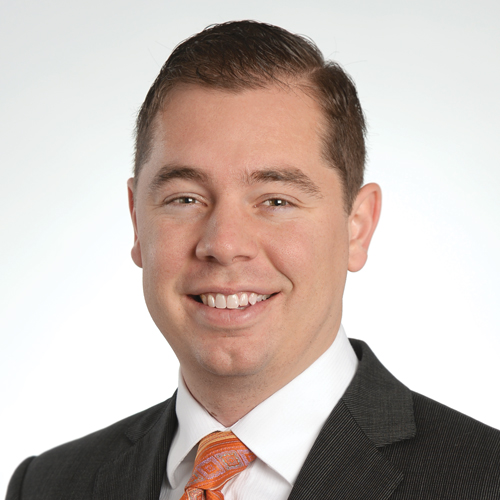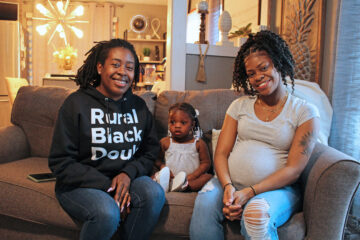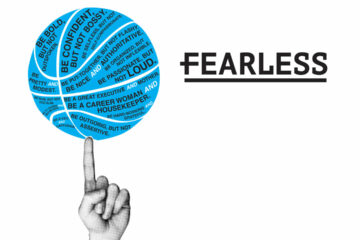By Emily Barske, Business Record editor

Emily Barske, Business Record editor 
Chris Conetzkey, Business Publications Corp. group publisher
The #MeToo movement is often associated with the downfall of powerful men who for too long abused their authority and influence to harass or assault others, often women. But the movement also gave rise to more thoughtful rhetoric on the flip side: how men can and should use their privileges to support women as allies in the workplace.
Ask a group of people to describe an ally and individual answers will diverge. Merriam Webster defines ally as “one that is associated with another as a helper: a person or group that provides assistance and support in an ongoing effort, activity or struggle.”
When it comes to the crusade for gender equity, the shoe fits. Fighting for women’s rights in society, at home and in the workplace is certainly an “ongoing effort” that requires the support of men. While there are systemic changes that would support all women, what individuals need will look different case by case.
For me, allyship is supporting my dreams and letting me show up authentically. As a young woman in a leadership role, I need male allies who will welcome me to a seat at the table, make me feel like I belong there and create space for my voice when others don’t.
Knowing that this year was the five-year anniversary of the #MeToo movement, I wanted to have a genuine conversation about male allyship in the workplace. My boss, Chris Conetzkey, who is the group publisher of Business Publications Corp., mentored me before I joined the company. I met Chris when I was in college and serving as the editor-in-chief of the Iowa State Daily. Having also served as a past editor-in-chief, he was on the publication board.
When I heard Chris at one of our training sessions for the first time, I quickly realized how similar our visions for journalism were. I met with him several times while I was still in college, asking his advice, learning about what he did and sharing my own ideas.
Down the road our paths were able to more formally cross when the Business Record editor position opened and he asked me to join the team to take on the role. This is a topic we talk about often when it is relevant to current situations. But I wanted to have a formal discussion with this topic being the key component. Here’s some of what we reflected on.
Note: While women, gender-nonconforming individuals and men are targets of sexual misconduct or discrimination, this conversation focused on the power imbalance between women and men.
Our conversation
If nothing else, #MeToo showed many people how naive they were. “I feel like I was aware that situations happened,” Chris said. “I know that there are people that are bad actors. I don’t think I understood how prevalent it really was and the range and degrees of how it could happen.”
Because of working in a woman-owned and woman-led organization, in addition to covering the movement from a news standpoint, he was able to regularly engage in dialogue to learn how to better understand these issues. Not everyone has had that opportunity. We need all people to be engaged in understanding more about gender equity.
For me, #MeToo emphasized how work and life blend together. Regardless of where one experiences sexual misconduct, the trauma associated leaks into other parts of your life. When you are targeted by a perpetrator, fear, shame, anger and other associated emotions follow you wherever you go. #MeToo blew up the narrative that if something happened at work you could just brush it off and go home – or vice versa.
We discussed that the movement also created a way for very common experiences to be vocalized in a way they weren’t before. For men, who don’t experience misconduct at as high a rate, the fact it exists may not even be on their radar. Chris described being angry on behalf of women sharing experiences of harassment, but knows it’s not the same as hearing stories from others when you too have experienced gender-related adversity and discrimination. “When you’re never thinking about experiencing that yourself, then you’re blind to the things that are happening to other people,” Chris said.
He also remembered the reflection he did at the time of #MeToo’s height in 2016. He thought about things like whether he’d ever said or done something offensive without realizing it, or whether it was still OK to have a closed-door meeting while alone with a female colleague and whether that made them uncomfortable.
For women, too, it was a time to reflect. Perhaps on their own experiences as targets. There were also realizations that they had accepted assault, manipulative behavior or crude remarks as “just the way things are” – perhaps when they or someone they knew experienced misconduct in the past. All of these realizations can be riddled with shame, anger or guilt – even though the fault lies solely with perpetrators.
Chris and I discussed that being a male ally is more than just being against behaviors such as assault and harassment that many in society believe to be unacceptable.* Being a male ally means standing up to any dynamics that create an imbalance of power. For me, some of the most helpful actions Chris takes are introducing me to new people by sharing my accolades or asking me to weigh in first when someone poses a question to him. These actions are important because it tells whomever we’re with that I deserve to be there on my own merits and that my perspective matters.
In an ideal world, we wouldn’t need men to raise women up in these scenarios – we would feel welcome enough to do it for ourselves. But for myriad reasons, there are settings where this is not easy for women.
It must be understood that even when women work hard to be confident, the vast majority of us have at times experienced microaggressions or misconduct that have made us feel belittled or unworthy. Anytime you choose to be confident, you have to unlearn protective mechanisms, such as being less vocal, that you have adopted so you don’t have to relive painful experiences of being made to feel less than. Yes, there are ways we can work to ensure that women and girls have more confidence in themselves, but it is not just an individual choice. We have to recognize that it’s hard work to show up confidently when memories of adversity deeply affect you.
There are some things that come easily to me – like calling someone out when I recognize that something is unfair to me or perhaps others, or putting myself out there for an opportunity that I’m unsure whether I’m qualified for. And there are other things, like I mentioned above, that are much more difficult for me. But that’s based on my personality – each person needs different support. Allies should work to create belonging in an environment where individuals are seen for who they are and what they’ve experienced.
Addressing any and all instances of inequity is important in making steps toward gender equity. Male allies are crucial to that.
“My call to action is to make space and time to have real conversations and contemplation about these topics in a safe environment,” Chris said. “Reading is the easiest – and it’s a good first step. But, in my experience, talking always produces a depth of understanding well beyond reading. And when you do talk, make sure it’s less of you talking, and more of you asking questions and listening. As Emily mentioned, I have been fortunate to have safe places to engage in dialogue, and that means I’ve stumbled over my fair share of poorly asked questions, misunderstandings and realizations that I was glad I did so while in a trust-filled environment.
“Want some advice on how to talk about #MeToo? Yes. You do. I promise. Here’s a piece that you might find helpful.”
My advice on having conversations – and conversations must be had – is to acknowledge that it’s a bit awkward, yet extremely important. Be upfront in saying that you might not get your words exactly right and ask for help in understanding when you don’t. One of our Fearless initiative core beliefs is that women’s and gender issues are everyone’s issues. We all play a role in creating equitable workplaces.
Footnote:
*As someone who has been involved with multiple orgranizations that serve survivors of sexual and domestic violence, I know there is still not enough being done to raise awareness and stop sexual assualt and harrassment. Many who have not been affected by these issues don’t realize how prevalent they are — every 68 seconds someone is sexually assaulted, and nearly 20 people per minute are physically abused by an intimate partner in the United States. Survivors experience long-lasting trauma, which affects how they show up in any space, including the workplace. To gain a better understanding, put “Know My Name” by Chanel Miller on your reading list.
RELATED: If you’re looking for some good food for thought on the topic of male allyship, check our Fearless Editor Emily Kestel’s reporting last year: “A conversation with the ‘Good Guys’ on how men can be successful allies for women in the workplace.”

